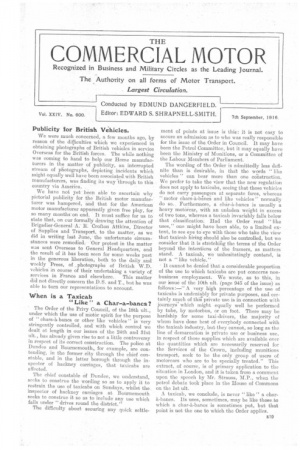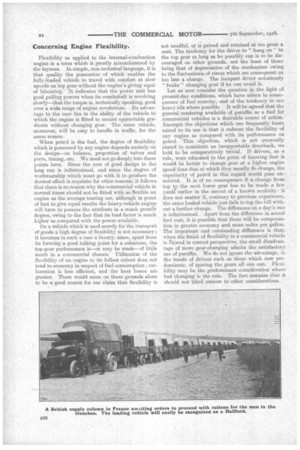Conducted by EDMUND DANGERFIELD.
Page 1

Page 2

If you've noticed an error in this article please click here to report it so we can fix it.
Vol. XXIV. No. 600. Editor: EDWARD S. SHRAPNELL-SMITHLi 7th September, 1916
Publicity for British Vehicles.
We were much concerned, a few months ago, by reason of the difficulties which we experienced in obtaining photographs of British vehicles in service Overseas for the British forces. The while nothing was coming to hand to help our Home manufacturers in the matter of publicity, an interrupted stream of photographs, depicting incidents which might equally well have been associated with British manufacturers, was finding its way 'through to this country via America. We have not yet been able to ascertain why pictorial publicity for the British motor manufacturer was hampered, and that for the American motor manufacturer apparently given free play, for so many months on end. It must suffice for us to state that, on cur formally drawing the attention of Brigadier-General A. It. Crofton Attkins, Director of Supplies and Transport, to the matter, as we did in writing last June, the unfortunate circumstances were remedied. Our protest in the matter was sent Overseas to General Headquarters, and the result of it has been seen for some weeks past in the generous liberation, both to the daily and. weekly 'Press, of photographs of British W.D. vehicles in course of their undertaking a variety of services in France and elsewhere. This matter did not directly concern the D.S. and T., but he was able to turn our representations to account.
When is a Taxicab "Like " a Char-a-bancs ?
The Order of the Privy Council, of the 18th ult., under which the use of motor spirit for the purpose of " chars-a-bancs or other like vehicles" is very stringently controlled, and with which control we dealt at length in our issues of the 24th and 31st ult., has already given rise to not a little controversy in respect of its correct construction. The police at Dundee and Bournemouth„ for example, are contending, in the former city through the chief constable, and in the latter borough through the inspector of hackney carriages, that taxicabs are affected.
The chief constable of Dundee, we understand, seeks to construe the wording so as to apply it to restrain the use of taxicabs on Sundays, whilst the inspector of hackney carriages at Bournemouth seeks to construe it so as to include any use which falls under " drives round the district." The difficulty about securing any quick settle ment of points at issue is this: it is not easy to secure an admission as to who was really responsible for the issue of the Order in Council. It may have been the Petrol Committee, but it may equally have been the Ministry of Munitions, or a Committee of the Labour Members of Parliament.
The wordine-° of the Order is admittedly less definite than is desirable, in that the words "like vehicles" can bear more than one construction. We prefer to take the view that the new regulation does not apply to taxicabs, seeing that those vehicles do not carry passengers at separate fares, whereas "motor chars--banes and like vehicles" normally do so. , Furthermore, a chtir-h-bancs is usually a heavy motorcar, with an unladen weight in excess of two tons, whereas a taxicab invariably falls below that classification. Had the Order read "like uses," one might have been able, to a limited extent, to see eye to eye with those who take the view that taxicab hiring should also be controlled, but we consider that it is stretching the terms of the Order beyond the intentions of the framers, as matters stand. -A taxicab, we unhesitatingly contend, is not a "like vehicle."
• It cannot be denied that a considerable proportion of the use to which taxicabs are put concerns nonbusiness employment. We wrote, as to this, in our issue of the 10th ult. (page 945 of the issue) as follows:—" A very high percentage of the use of taxicabs is undeniably for private purposes, and certainly much of this private use is ii connection with journeys which might equally well be performed by tube, by motorbus, or on foot. There may be hardship for some taxi-drivers, the majority of whom have done best of everybody connected with the taxicab industry, but they cannot, so long as the line of demarcation is private use or business use, in respect of those supplies which are available over the quantities which are necessarily reserved for the Services of the Crown, including munitions transpoit, seek to be the only group of users of motorcars who are to be specially treated." This extract, of course, is of primary application to the situation in London, and it is taken from a comment npon the speech by Mr. Strauss, M.P., when the petrol debate took. place in the House of Commons on the 1st ult.
A taxicab, we conclude, is never " like " a charia-bancs. Its uses, sometimes, may be like those to which a char-h-banes is sometimes put, but that point is not the one to which the Order applies.
Concerning Engine Flexibility.
Flexibility as applied to the internal-combustion engine is a term which is greatly misunderstood by the layman. In simple, non-technical language, it is that quality the possession of which enables the fully-loaded vehicle to travel with comfort at slow speeds on top gear without the engine's giving signs of labouring. It indicates that the power unit has good pulling powers when its crankshaft is revolving slowly—that the torque is, technically speaking, good over a wide range of engine revolutions. Its advantage to the user lies in the ability of the vehicle to which the engine is fitted to mount appreciable gradients without changing gear. The same vehicle, moreover, will be easy to handle in traffic, for the same reason.
When petrol is the fuel, the degree of flexibility which is possessed by any engine depends entirely on the design—on balance, proportion of valves and ports, timing, etc. We need not go deeply into these points here. Since the cost of good design in the long run is infinitesimal, and since the degree of workmanship which must go with it to produce the desired effect is requisite for other reasons, it follows that there is no reason why the commercial vehicle in normal times should not be fitted with as flexible an engine as the average touring car, although in point of fact to give equal results the heavy-vehicle engine will have to possess the attribute in a much great& degree, owing to the fad that its load factor is much higher as compared with the power available.
On a vehicle which is used merely for the transport of goods a high degree of flexibility is not necessary ; it becomes in such a case a luxury, since, apart from its forming a good talking point for a salesman, the top-gear performance is—or may be made—of little merit in a commercial chassis. Utilization of the flexibility of an engine to its fullest extent does not tend to economy in respect of fuel consumption ; carburation is less efficient, and the heat losses are greater. There would seem on these grounds alone to be a good reason for our claim that flexibility is not needful, or is gained and retained at too great a cost. The tendency for the driver to " hang on" to the top gear as long as he possibly can is to be discouraged on other grounds, not the least of these being that of depreciation of the mechanism owing to the fluctuations of stress which are consequent on too late a change. The inexpert driver notoriously " funks" changing gear if he can avoid it.
Let us now consider the question in the light of present-day conditions, which have arisen in consequence of fuel scarcity, and of the tendency to use heavy oils where possible. It will be agreed that the general rendering available of paraffin as a fuel for commercial vehicles is a desirable course of action. Amongst the objections which one frequently hears raised to its use is that it reduces the flexibility of any engine as compared with its performance on petrol. This objection, which is not unusually stated to constitute an insupportable drawback, we hold to be comparatively trivial. If drivers, as a rule, were educated to the point of knowing that it would be better to change gear at a higher engine speed than that at which they usually do change, the superiority of petrol in this regard would pass unnoticed. It is of no consequence if a change from top to the next lower gear has to be made a few yands'. earlier in the ascent of a known acclivity : it does not matter if, contrary to previous experience, the same loaded vehicle just fails to top the hill without a further change. The difference on a day's run is infinitesimal. Apart from the difference in actual fuel cost, it is possible that there will be compensation in greater economy and more miles per gallon. The important and outstanding difference is that, when the fetish of flexibility in a commercial vehicle is irliewed in correct perspective, the small disadvantage of more gear-changing admits the satisfactory use of paraffin. We do not ignore the advantage, in the hands of drivers such as those which now predominate, of sparing the gears all one can. Flexibility may be the predominant consideration where bad changing is the rule. The fact remains that it should not blind owners to other considerations.




















